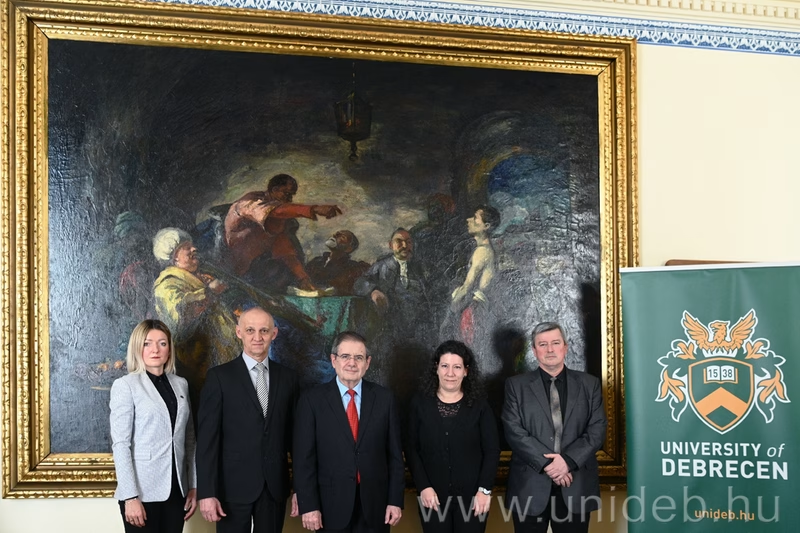
The University of Debrecen in Hungary continues to build vital international relationships, with a notable focus on fostering cooperation with Cuba. Recent visits by Cuban diplomats and strategic discussions have laid the groundwork for future collaborations in research, education, and technological development. For students, researchers, and professionals interested in global academic partnerships, this ongoing engagement highlights the potential for meaningful scientific exchange and mutual benefit.
Expanding International Relations: The University of Debrecen’s Initiative with Cuba
The University of Debrecen (UD) has long been recognized for its multidisciplinary approach, strong research infrastructure, and its active participation in international scientific collaborations. Its recent initiative to deepen ties with Cuba underscores its commitment to fostering global partnerships that align with Hungary’s reputation for academic excellence and innovation.
The visit by Guillermo Vázquez Moreno, the Cuban ambassador to Hungary, marked a significant step in this strategic effort. During his visit, he expressed admiration for the university’s broad training portfolio, cutting-edge research results, and its ability to meet modern industrial demands. His recognition affirms the importance of the university’s role on the international stage and opens avenues for new collaborative projects.
Key Areas of Collaboration Between University of Debrecen and Cuba
The discussions between university representatives and the Cuban ambassador centered around establishing cooperation in diverse scientific fields. Notably, the University of Debrecen’s strengths in biotechnology and medicine attracted particular interest, as Cuba is recognized for its advancements in these sectors. This alignment creates a promising foundation for joint research projects and knowledge exchange.
Biotechnology and Medical Research
Both regions have a strong focus on biotech innovations and healthcare solutions. The upcoming visit of Cuban biotechnology specialists to Debrecen in March is a concrete step toward joint R&D activity. These exchanges can accelerate vaccine development, medical device innovations, and biological research, addressing global health challenges.
Other Potential Fields of Cooperation
- Vaccine development: Collaborative efforts to innovate and improve immunization techniques.
- Agricultural sciences: Sharing expertise to enhance food security and sustainable agriculture practices.
- Renewable energy: Joint projects to develop sustainable energy solutions and technologies.
- Artificial intelligence: Exploring AI applications in healthcare, automation, and industry.
By combining Cuba’s strengths with the infrastructure and academic excellence of the University of Debrecen, both parties aim to foster impactful projects that can benefit their respective nations and the global community.
Supporting Education and Research Through International Student Programs
Beyond research partnerships, the university emphasizes the importance of student exchange and training programs. The Hungarian government’s Stipendium Hungaricum provides an excellent platform for Cuban students to pursue higher education and PhD studies at Debrecen. This effort not only enhances cultural and academic ties but also ensures the development of a new generation of scientists and professionals equipped with global expertise.
For Cuban scholars interested in advancing their careers through international education, these opportunities are particularly valuable, offering access to advanced facilities and collaboration networks. The PhD training programs, supported by Hungarian scholarships, are designed to promote long-term academic partnerships and knowledge transfer.
Industrial and Research Infrastructure Supporting Scientific Cooperation
The discussions also highlighted the university’s research infrastructure, including its industrial park and specialized laboratories. These facilities serve as hubs for applied research, fostering innovation in biotech, industrial chemistry, renewable energy, and artificial intelligence. Visiting the industrial park provided Cuban delegation members a firsthand view of the university’s capabilities and the potential for joint ventures.
Such infrastructure is essential for translating research into practical applications, creating new opportunities for industrial partnerships, and attracting further international cooperation.
The Future of the University of Debrecen and Cuba’s Scientific Relationship
The upcoming visit by Cuban biotechnology specialists in March signifies both the confidence in this partnership and its strategic importance. As cooperation develops, jointly funded projects, student exchanges, and collaborative research centers are expected to flourish.
This ongoing relationship demonstrates the growing global role of universities like Debrecen in linking science, education, and industry across borders. For students, researchers, and institutional partners, it offers new avenues for growth, innovation, and shared knowledge.
Looking to study in Hungary? The University of Debrecen offers top-ranked degree programs, vibrant student life, and exciting opportunities for international students. Fill out the form and get guidance from expert counselors every step of the way.

